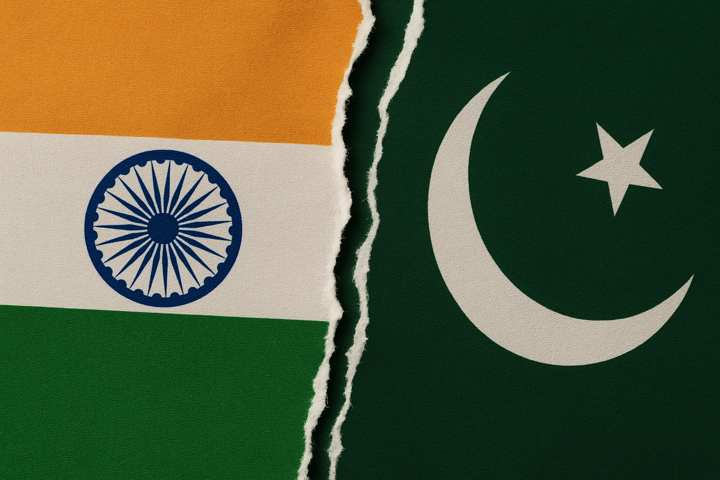On April 22nd, 2025, 26 innocent tourists were killed in a terrorist attack in Pahalgam, part of the Indian-administered territory of Kashmir. 25 victims were citizens of India, one was a citizen of Nepal (A Memorial to Victims of the Pahalgam Terror Attack. The Hindu, April 2025). According to eyewitnesses, the terrorists deliberately killed non-Muslims. May Allah forgive the victims of any sins or trespasses they had in this life and judge them with kindness and mercy. May Allah ease the suffering of the families and communities affected by this attack and may Allah grant them peace and justice. Ameen.
What Happened in Kashmir?
The attack occurred in Kashmir, which has been heavily disputed between India and Pakistan since the nations were partitioned in 1947. Both India and Pakistan claim the entirety of the territory. After having fought three wars over control of the territory, each country administers its own section of the territory. The region has become a hotbed for militant Islamic groups who demand either independence for Kashmir or for it to join Pakistan. These groups have fought Indian security forces for decades, which has led to the Indian government claiming that these groups are supported by Pakistan, a claim which the Pakistani government denies. Kashmir Resistance (TRF) has claimed responsibility for the April 22nd attacks. In their video claiming responsibility, TRF blamed “outsiders” settling in the region and increasing the Hindu population. The group is relatively new, having been formed in 2019. India has identified two of the attackers as Pakistani nationals. The Indian government classifies the TRF as a terrorist organization, and it is suspected to be linked to Islamist group Lashkar-e-Tayyiba, which was behind deadly attacks in Mumbai in 2008 (Mogul, Rhea. A tourist massacre in Kashmir is escalating tensions between India and Pakistan. Here’s what we know. CNN, April 25, 2025).
Terrorism has no place in Islam, and those who carry out terrorism while claiming to be Muslims pervert the true Islam and the message of the Holy Prophet Muhammad (SAW). The teachings of Islam exhort all Muslims to be upright, just, kind, and compassionate, the very opposite of what terrorists are. If any Muslim believes they are faced with injustice, they are to reason and argue with the oppressors for the sake of obtaining justice. If and only if reason has failed repeatedly, then and only then are Muslims allowed to use force to obtain justice. Muslims are never permitted to go beyond how they have been wronged or create any injustice while they are fighting (Khan, Abdul Ghany Jahengeer. Islam’s Response to Terrorism. Al-Islam). It is clear from Islamic teachings that there is no room to justify any act of terrorism. The only type of war that can be justified by Islamic teaching is a defensive war fought to preserve freedom of religion. This is made clear by the Holy Qur’an, “And fight them until there is no persecution, and religion is freely professed for Allah. But if they desist, then remember that no hostility is allowed except against the aggressors” (Holy Qur’an, 2:194). This verse makes it clear that war is only to affect the oppressors, and as soon as they stop their evil ways, hostility must cease. The Holy Prophet (SAW) has also made clear the limitations of warfare in Islam: “You will meet those who remember Almighty Allah in their houses of worship. Have no dispute with them, and give no trouble to them. In the enemy country, do not kill any women or children, or the blind, or the old. Do not pull down any tree; nor pull down any building.” (Halbiyyah, vol. 3). Islamic teachings enjoin reason and logic for solving disputes, and only permit violence and warfare in the face of extreme persecution. Even when violence is allowed, Muslims are only to fight the aggressors, never to harm innocents or noncombatants, and to seek peace at every opportunity and cease fighting as soon as the evildoers do. There is no place in Islam to justify the cold-blooded murder of 26 innocent civilians. Such actions run entirely against the teachings of Islam, and these terrorists bring disgrace to the name of Allah and His Messenger (SAW).
How did India and Pakistan respond to the attacks?
The attacks significantly damaged the relationship between India and Pakistan. India blamed the Pakistani government for the attacks, accusing them of sheltering and arming the terrorists. The Pakistani government wholeheartedly denied these accusations, and challenged the Indian government to provide evidence. India expelled Pakistani diplomats from embassies, closed border crossings, and withdrew from the 1960 Indus Water Treaty. The Indus River flows through Indian-administered Kashmir into most of Pakistan, and the Treaty governs how the water is shared. More than a month later, India has still not rejoined the Treaty and Pakistan has warned that any attempt to divert water will be considered an act of war (Singh, Sarita Chaganti, What is the Indus Waters Treaty between India and Pakistan? Reuters, April 25, 2025). The most dramatic response began on May 7, 2025, when India launched retaliatory airstrikes into Pakistan, nicknamed Operation Sindoor. While India claimed the targets were strictly terrorist related as payback for the Pahalgam attack, several mosques were hit and a 3-year old was killed. India claimed that Pakistan responded with a massive drone attack that was intercepted and thwarted by the Indian Air Force – a claim which the Pakistani government denies. India responded to the alleged drone attacks by striking military targets in Pakistan, specifically the air defense system in Lahore. Pakistan vowed it would retaliate, and the two nuclear-armed powers stood on the brink of war. On Friday, Pakistan launched drone and missile strikes at Indian military targets, most of which were intercepted. Cross-border shelling forced thousands to evacuate in Kashmir and caused heavy civilian casualties. With millions of lives hanging in the balance as the conflict continued to escalate, a US-brokered ceasefire was announced late on Saturday, May 10 (Mashal, Mujib. What We Know About How the 4-Day India-Pakistan Clashes Unfolded. The New York Times, May 11, 2025). One thing that makes this conflict unique is the role disinformation played in escalating it. Artificial intelligence deepfakes of politicians spreading false information were often used. Disinformation about the severity, or even the occurrence, or strikes from one side was used to falsely cause panic and escalate tensions (Ellis-Petersen, Hannah. How social media lies fuelled a rush to war between India and Pakistan. The Guardian, May 28, 2025). The impact that online disinformation had in causing tensions to rise displays the changing nature of war. False information nearly pushed these two nuclear-armed nations to war, and it led to the death of hundreds. This is a serious threat to world peace, since it will be impossible for two countries to negotiate if they cannot even agree on simple facts.
What does Islam teach about this?
The Holy Qur’an places a high emphasis on truthfulness and strongly discourages spreading or believing gossip or rumors. Regarding receiving information, the Holy Qur’an commands Muslims: “O ye who believe! if an unrighteous person brings you any news, ascertain the correctness of the report fully, lest you harm a people in ignorance, and then become repentant for what you have done” (Holy Qur’an 49:7). This verse tells believers that if information comes from a source they do not fully trust, then it is the duty of the believer to verify the information so it is truthful before acting upon it. It is shameful to see Muslim Pakistanis and Indians online falling victim to and spreading misinformation to try and achieve their political agendas. This conflict also exposed the increasing threats to world peace in the modern era. The leader of the Ahmadiyya Muslim Community, Hadhrat Mirza Masroor Ahmad (aba) has warned world leaders that we are approaching a Third World War, and action needs to be taken now by world leaders to preserve peace. Two nuclear-armed nations heading to the brink of war and almost dragging in larger allies shows just how much the world needs the message of peace and True Islam that is Islam Ahmadiyyat. Both the Pakistani and Indian governments must take steps to reduce tensions in the region and build a sustainable, lasting peace. Pakistan should work with India to help find Islamist terrorists and deliver justice to the victims and their families, and India should do more to address the rising anti-Muslim sentiment to prevent reciprocal attacks and the radicalization of young Muslims. Rising tensions and hatred between these nations will only lead to more violence and more radicalization, perpetuating this cycle. Hatred will only ever beget more hatred, and violence will only ever beget more violence. May Allah enable the leaders of Pakistan and India to proceed with reason and work together to achieve peace and harmony. May Allah help deliver justice to the terrorists who have committed this attack. May Allah grant Indians and Pakistanis compassion and understanding between them so that this vicious cycle of hatred and violence may be replaced with one of peace and love. Ameen.













